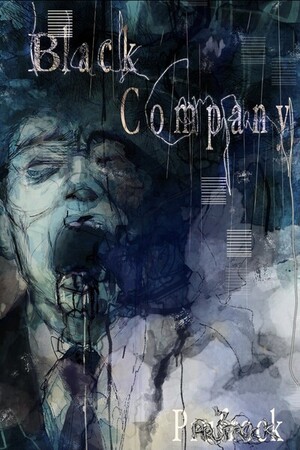Chapter 1:
The Operation
Mutual Monster
The beginning was red. And the middle. And end. From crimson dawns to bloodied fields, memorial roses to hate-filled visions, my existence was engulfed in red. I had been born into a war spanning generations. Humanity fought Arachnites, an endless swarm of car-sized, spider-snake hybrids. Nobody knew their origins or goals, but when a leathery tail crushed your body and fangs pierced your flesh, deeper motivations aren’t a pressing issue. The war was supposed to end in my lifetime. My generation were supposed to bring salvation. I was supposed to be at the fore. But, despite hopes, immense worry filled me; an unanswered, crushing question persisted:
‘Had the “red” of life truly cleared?’
I had closed my eyes in a sterile operating room, surrounded by surgeons. They were going to make me humanity’s salvation – a final weapon. But, after a blur of seconds or years, I opened my eyes in a tunnel, surrounded by unknown, dirtied faces. They wore mining gear and held pickaxes, shovels, hand drills, and buckets. The smell of blood, sweat, and earth permeated the area. There was another smell. Lavender? My other senses were dulled. My body was too weak to move. Somebody called the name “Shinjiro” and a tear-streaked face responded.
No, I thought. It wasn’t right. I was supposed to open my eyes to blue skies and proud faces. There was going to be a parade. What happened? Though the people around me spoke, I shut my eyes and ignored their voices. Remember, I thought. Think back…
My memories stretched to the day before the operation.
I had walked through a military base. Father’s office was at the hall’s end. As I went, it was impossible to ignore my peers’ baleful looks. I tried. I sped up and pushed into Father’s office without knocking. ‘No,’ he said, without prompting.
‘I can do it,’ I snapped.
‘The meanings of “can” and “should” are vastly different.’ Father set documents aside and massaged his brow. Grey flecked his temples, though age didn’t dampen his severe gaze.
‘I must do this,’ I amended, trying and failing to keep desperation out of my tone. ‘If I don’t, the world will remember Yagi Akinori as a footnote, a random soldier who made a mistake and got a town massacred.’ I didn’t entirely believe my words. The world was more likely to remember the esteemed commander Yagi Katsuo. There might be a paragraph on his two wives and multiple children, one of whom was named Akinori.
‘That wasn’t your fault,’ Father sighed.
‘You’re the only person who believes that.’
‘Well, if you’d stop talking about history and footnotes and glory for a few seconds, you might see there’re more important things than tomorrow’s operation. Not being remembered in this war is a good thing.’
‘I will be remembered, if you let me.’
‘You’re not listening,’ he mumbled.
‘I won’t let my story end like this.’
‘Is that all your convictions amount to? You want to sound cool in history books?’
‘I want to atone! Hundreds died in that town because of me. Let me do this and I’ll save thousands.’
Father’s expression darkened. ‘Numbers,’ he said under his breath. I paused, knowing my mistake. Father objected to simplifying people into logistics. Responses to his philosophy were…mixed. But, his expression cracked a moment later and I glimpsed the man behind the commander’s uniform. Tired. Empty. Resigned. It was in that briefest moment that I knew I held absolute, terrible power. Whichever option I selected—salvation or ruination—he’d permit. The weight of the decision suddenly pressed upon me. My shoulders loosened and fell. Here, with a single sentence, my path diverged:
‘I must,’ I stated.
Father locked eyes with me. Such a visage—it was unfamiliar, haunting. ‘You must,’ he murmured, and briskly extracted a new document from his desk. I filled it out before I changed my mind, and he stamped it for approval.
As I made to leave his office, Father asked:
‘Do you wish to know what the operation entails?’
I raised a brow. Everyone knew the operation was a risk, but the benefit and possible salvation was deemed worthwhile. The specifics were kept secret for a reason, to avoid sowing unease in those undergoing it. Did Father speak to me as a parent, or superior? Or, perhaps, even as a friend. Regardless, I shook my head. ‘No need,’ I stated. ‘Wouldn’t change a thing.’
So I claimed. So I thought. So I was mistaken.
As I left Father’s office, a profound unease settled in my heart, as if clouds of volcanic ash blocked the sun.
#
My mood brightened when, a few hours after talking with Father, I encountered Ren in the courtyard. She was my age and height, but her hair was darker, a blackness like rich velvet reaching the small of her back. Her grey eyes made some people wary, and as a result she made an effort to always be optimistic and friendly. Her efforts seemed exhausting, so I’d made it clear long ago that she didn’t need to try so hard around me.
Ren sat on a bench and watched the sunset over the ocean. I sunk onto the spot adjacent. We remained silent for a time. ‘How’d it go?’ she asked, to which I showed the form approved by Father. Ren offered a smile tinged with an unknown emotion. I hoped it was gentle pride, not pity.
‘They’re still talking about me,’ I remarked, sullenness returning.
‘It’ll pass.’ Ren had a pleasant, clear voice: articulate not quiet, confident not meek. I envied her eloquence.
‘I showed the form a few times, but they seemed more pissed off.’
‘You should really ignore them.’
‘It’s like they don’t understand why I need to do this.’
‘Not sure I do, either, to be honest,’ Ren murmured, and swivelled to face me. ‘Your siblings made it to the northern outpost, didn’t they? Your dad’s stationed here.’
‘So?’
‘…Nothing.’
I grimaced. The conversation hadn’t gone the way I imagined. ‘H-Have they packed your Stasis Box?’ I asked to change the subject. Ren nodded. ‘What’d you pick?’
She smirked. ‘Can’t tell you.’
I had planned to mention what I chose, but claiming it was a secret sounded better. Besides, the contents were designed to be private.
As I considered other topics, multiple footsteps neared. ‘Hear you got approved, Yagi.’ The voice belonged to Thao, flanked by his buddies. His rough appearance and broad frame belied the fact he was only a couple years older than me. ‘Oh, Aikawa’s here, too.’
I shot to my feet. ‘Need something?’
Thao shrugged. ‘Not anymore. The operation tomorrow will make the world perfect and shiny, eh?’
‘If you have something to say—’
Thao took a step forward. I twitched. He shook his head and sneered. ‘Thought I’d hit you? Arachnites are the enemy; wish you’d remember that. As for talking, fine: You two should back out.’
Ren looked over her shoulder. ‘Bit late now.’
‘Recycling trash won’t turn it gold,’ Thao said.
I scowled. ‘You won’t talk like that when we’re getting medals.’
‘Medals,’ he smirked. ‘Dr Eberhardt said the operation relies on internal resolve. Do you two really qualify?’
‘That’s not your call.’
‘Lucky for you. Unlucky for people who need saving.’
My jaw clenched, fists forming. I wasn’t sure what I’d have done or said, but I didn’t get the chance. Thao turned away, ensuring he “won” the conversation. I was guaranteed to replay the conversation later, wishing I’d said something wittier.
I settled back to Ren’s side and apologised, though she didn’t appear perturbed by Thao’s words. She said with sincere interest:
‘Do you think we can do it?’
‘Of course,’ I replied, sharper than intended.
‘Are you just saying that?’
‘Well.’ I gazed at the fading sunset. ‘I’m going to try.’
Ren smiled, genuine and clear. ‘I’m sure we’ll make it through.’ Distant speakers crackled to life and gave the call to return to our dormitories. Ren stood, stretched, and nudged me. ‘C’mon, can’t save the world without a good night’s sleep.’
We departed alongside each other, steps even and measured, marching to our great and terrible destiny.
#
I slept little that night. I thought of the operation, of Thao—changing the conversation so I spoke better—of what would happen the next day, of Ren, of Father, of the ravaged world in need of our salvation. Then dawn crept up. My eyes wavered and opened, still tired. But…
It was time.
The following hours passed in a blur.
None of us had eaten the previous night, and we couldn’t have breakfast, as prescribed by Dr Eberhardt for the operation. Instead, I dressed and met Ren in the courtyard. Then we walked to the underground facility. The morning was spent among dozens of others selected for the operation. Dr Eberhardt, with Father at her side, talked us through the basic parameters of her plan. To my surprise, she offered a final chance to walk away. A handful accepted the offer. Though I was tempted to scowl at what I perceived as cowardice, I refrained. Part of me, even then, acknowledged the validity of their choice.
This done, she glanced at Father, who stepped forward to deliver a quick speech about our bravery and sacrifice. I didn’t pay attention. My thoughts lingered on how he and Dr Eberhardt looked at each other. I had fragmented memories of my mother, but it had been years since her passing. I could not help wondering what unspoken words passed between Father and Dr Eberhardt; it seemed they had an entire conversation in the span of a half-second. They’d worked together long before either of Father’s marriages. Not that it was relevant, but I thought it was possible—
The sudden movement around me dislodged my thoughts and refocused them to the current task. Our group marched through a hall lit by white arrows on the floor and walls. The passage led into a sterile white hallway, where gradually the group was sent into separate operating rooms.
Ren and I neared the rooms at the end. She was assigned to the room on the left, and I to the right. ‘See you at the parade,’ she laughed.
Attendants ushered us into our respective rooms. I watched Ren through the doors as they slid shut. Her features betrayed her. Fear flashed. I couldn’t dwell on it. The attendants led me to a sloped chair. It resembled apparatus I’d seen in a dusty book about an old, esoteric profession called “dentistry”. My unease grew when they strapped my wrists and ankles to the chair.
A door slid open and Dr Eberhardt entered an observation room, perhaps overseeing my operation as an obligation to Father. The tension seeped from my limbs. I’d never noticed how she was taller than most men, and her upright, almost regal posture enhanced the effect. She wore a dark blue jumpsuit, like a pilot, zipped up to her neck.
In a few minutes, the operation began. A sedative made me lose consciousness, but seemingly moments later it wore off. Someone shouted. Dr Eberhardt gave orders from the observation room. Rumbling came from the other rooms. Dust fell from the ceiling tiles. The overhead lights felt too bright. Pain lanced through my whole body, like heated silver coursed through my veins. I may have screamed or thrashed, but my mind and body felt separated, as if railway spikes had been jammed into my brain.
Then.
Nothing.
When next I opened my eyes, I stared up at dark tunnel walls and dirtied faces.




Please sign in to leave a comment.